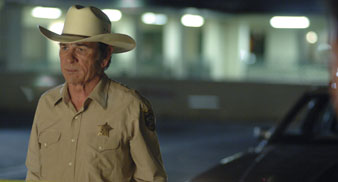UNCUT: Had you read any of Cormac McCarthy’s books before you did this movie?
TOMMY LEE JONES: Yeah.
Do you like his books?
I think Cormac is the finest living prose stylist in America.
You seem to be made to play one of his characters.
Oh good. I’m glad I gave that impression. I know Cormac and saw him while I was in New Mexico, but I never saw him on set. We know one another from the past.
You seem very like your character Ed Tom Bell: you choose your words wisely, you don’t bullshit, you say how it is. Was it easier for you to play this guy, because it’s closer to home?
Well, what I like about him is that he’s a character out of Cormac McCarthy’s book. That’s what I like the most. The language is just beautiful and that’s really something to work with. And it’s flattering to me that he would think that I am like that character. I am nothing like that character. But it’s very nice that you think that that is the real me because that means that I’m doing my job, it means that I’ve disappeared, which is definitely my job. When you begin to take these things personally you are not meeting your responsibility in my opinion.
What about the Coens? Were you a fan of their work before they came to you?
Of course.
What are they like to work with?
They’re well organised, thoroughly prepared and open-minded. They’re rather generous, and highly professional.
They are reputedly very exact about their scripts – is there room for improvisation?
Oh I hate improvisation, it’s a very small interest. Preparation is very important, rehearsal is very important. Of course, spontaneity is important, but what you want to do is labour as hard as you can to create an inarguable illusion of spontaneity. The real thing is dangerous.
So what is the real you?
I don’t have to tell you!
You seem to be working less these days is that because you want to relax more or because there are less good scripts coming your way?
I don’t know about less. I made three movies this year.
What do you do when you’re not working?
Well we’re in the cattle business and we work at that everyday whether we’re shooting a movie or not. We raise and train and sell horses and I work at the movie business in one way or another everyday also.
Can you give us the number of cattle or horses you have on your ranch?
No.
Is that for tax purposes?
No. I just don’t look upon that as any of your business.
Do you like the movie Giant?
No.
Why?
It didn’t look like real life to me.
Did it reflect Texas to you?
Part of it did, because it was shot just west of my place. On Clay Evans’ ranch. In fact the framework for the house is still there. It’s nothing but telephone poles. You wouldn’t recognise it as a movie set.
Can you talk about some of your career highlights, or if you regret doing anything, or things you might have done differently?
I have no regrets. I can’t imagine any highlights, other than today.
There must be some highlights, how about Men In Black?
Oh, I love Men In Black.
When are you guys going to get back together and do another one?
That would be great. I’d love to see that. It was a highlight working with Clint Eastwood [Space Cowboys], it was a highlight working with Larry Olivier [The Betsy], it was a highlight working with Debbie Reynolds [Heaven & Earth]. Every day is a highlight.
No Country For Old Men hardly concludes conventionally – some might consider it pessimistic.
Well it’s a cerebral movie, but I wouldn’t say that it’s pessimistic. The last speech is a contemplation of hope, a dream about however dark and cold the world might be, however long the ride through it might be. That at the end you know that you will go to your father’s house and it will be warm, or to a fire that your father has carried and built for you. The last sentence of the movie is, “And then I woke up.” It’s a contemplation of the idea of hope. Is it an illusion? Is it just a dream? And if it is, is the dream real? I think it asks very good questions and I believe that an assumption by Cormac, by Ethan and Joel, and certainly by me, is that the very best questions are more important than anyone’s wide variety of answers.
IAN NATHAN
Click here to read Uncut’s review of No Country For Old Men.



